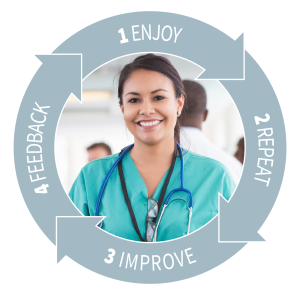One of the most difficult decisions in your life is choosing a career. It’s a decision that you are likely to make at least five times during your life, so you want to make the best decision possible. It can feel a bit overwhelming because for most of us there is so much uncertainty involved. We know the wrong choice can result in years of wasted time and money studying but we’re not really been taught how to make good choices that are going to be a match for our unique combination of skills, preferences and interests.
To be more successful, do what you enjoy
Research says we are three times more likely to be successful in a career that we enjoy. For me this just reinforces how critical a deep understanding of ourselves is to make good decisions. We need to know:
- what we enjoy doing
- what drives us
- what motivates us.

Its based on a concept called Enjoyment Performance Theory which very simply states that the things we enjoy doing, we do more often and consequently get better at. As we get better at them, we enjoy them more and the circle continues. To achieve high performance in the long term we need to know what we enjoy and just as importantly, what we need to avoid. You can perform in an unsuitable job for a while but ultimately its like swimming against the current. You are going to get worn out so you want to make sure you are swimming with the current, not against it. Just sounds like common sense doesn’t it?
Moving beyond gut decisions
For far too long these big decisions have pretty much been based on flicking through a careers guide and just picking something. Recent research by Forsee revealed that “no idea, just used gut instinct was the most common response to the question “how did you choose your career?” with 43% of responses. I put myself firmly in this camp too. I have no idea why I chose a business course after school. The next most popular response was “I kept trying different jobs until I found one I liked”. That’s great but what if you don’t stumble across a job that is a good fit for a long time? Some people might never find a good fit. This is too important to our lives to leave to chance.
We live in a time in which technology is radically changing our lives. One of the greatest benefits of this digital revolution is providing access to information that allows us to make better decisions. Whether it’s finding the best price, directions to the closest store or reviews on the food at the local restaurant, we now accept using technology to improve our decisions. So why is it that when it comes to one of the bigger decisions in our life we still just stick with gut instinct? Why wouldn’t we want to use a tool that can provide key information to help us make better career decisions?
Psychometric testing has come of age
Psychometric career testing technology has advanced to the point where it can now provide an accurate and valuable tool to assist your decision making process. It can confirm whether jobs you have in mind are suitable or present options that may not have crossed your mind before. We’re not talking about those free 2 minute quizzes that pop up on your news feed sometimes which generally have no psychological validity at all. While the Myers Briggs Type Indicator is the most commonly known personality test, not many people are aware that it was first published in 1943. It’s a great entry point to get the conversation started but our knowledge of how personality and suitability affect career choice and performance has moved on a long way from this. Tests like Harrison Assessments Paradox Technology are now virtually impossible to cheat on and truly depict a very accurate psychological profile of the individual. The reason so many of the world’s largest companies use these tests as part of their recruitment process is because:
- the cost of making a wrong decision is high
- quite simply, they know they work.
For ourselves, surely the cost of choosing an unsuitable career in our time, money and emotional well being is even higher.
How to find a good career match
Finding your passion is fantastic if you can, but it doesn’t have to be that clear cut, and for a lot of us it’s not. You just have to be in a career that suits your task preferences. The next question of course is “well how do I find out what my preferences are?” When it comes to assessing career fit or job match there are two areas you need to concern yourself with:
- Suitability – tests personality traits, interests and behavioural patterns to assess how suitable you are for a career path (basically, will you enjoy it?). There are no right or wrong answers to your unique personality and the tests are not flawless. An example is someone could potentially have a low suitability score but still enjoy the career if they had an intense passion for the area. That being said tools like Forsee are scientifically proven to be both valid and highly accurate and they can provide real insights into how you think and interact with others.
- Eligibility – assesses qualifications, skills and performance, such as Numerical Reasoning, Verbal Reasoning, Critical Thinking and Situational Judgement. It’s trying to answer the question “can you do it?”
There are plenty of jobs for which you might be suitable but not eligible, or eligible but not suitable. The secret to a good career match is being able to identify the roles that address these two key factors and allow you to find a job that you both enjoy and are capable of doing well.
How they help us choose our careers
The purpose of psychometric testing is to dig deep down into what people really mean. For example, almost everyone will say that they “want to work with people”, but working with people comes in many different forms. It could mean:
- they want to help others or
- they would be a good leader or
- maybe sales is a better fit for them?
The point is that a psychometric test will help you find out exactly which direction is most suitable for you and tailor job suggestions more accurately to your unique requirements.
Perhaps the main thing to remember about psychometric tests is this thought: most people, no matter how young or old, don’t truly understand their own personality and therefore don’t know how they will react to different careers. The best psychometric testing can provide a scientific, yet unbiased look into your future career path while providing insights into Emotional Intelligence (EI) by allowing you to reflect on your unique personality traits and behaviours. This technology allows people to make informed decisions on their careers without solely relying on traditional gut instinct.
Before you buy a house, get a building inspection
For me, I like to think of it like getting a building inspection before buying a house. Before spending a large amount of time and money, if I’m smart, I’ll spend a small amount now to access the best information available and reduce my chances of making a bad decision. When you consider that enjoying the main tasks of your career is one of the dominant predictors of success (and happiness) and that this technology helps you identify careers that you will enjoy, it seems obvious that we should all be taking advantage of psychometric testing to help us make better decisions and find careers we enjoy. Sometimes the best secrets are right in front of us.
Andrew Hartland is the Managing Director of Forsee, an Australian based company providing advanced career matching and personality testing to the general public. It only takes 20 minutes to complete, measures 175 traits and provides your matches from a range of 682 suitable careers. Forsee is currently available for a no obligation free trial here.

